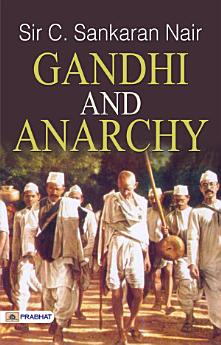Gandhi and Anarchy: Gandhi and Anarchy: Sir C. Sankaran Nair Discusses Gandhi's Views
Sir Chettur Sankaran Nair
Jan 2000 · Prabhat Prakashan
4.5star
8 reviewsreport
Ebook
232
Pages
reportRatings and reviews aren’t verified Learn More
About this ebook
Gandhi and Anarchy by Sir C. Sankaran Nair: In "Gandhi and Anarchy," Sir C. Sankaran Nair explores the philosophy and political ideology of Mahatma Gandhi. Nair engages in a thoughtful examination of Gandhi's principles of non-violence, civil disobedience, and his stance on British colonialism in India. This book provides valuable insights into the life and beliefs of one of the most influential figures in modern history.
Key Aspects of the Book "Gandhi and Anarchy":
Gandhian Philosophy: Nair delves into the core principles of Mahatma Gandhi's philosophy, including non-violence, truth, and resistance to oppression.
Political Discourse: The book offers a critical analysis of Gandhi's views on anarchy, colonial rule, and the path to India's independence.
Historical Context: Nair's work provides historical context for Gandhi's role in India's struggle for freedom and his enduring impact on the world.
Sir C. Sankaran Nair (1857-1934) was an Indian lawyer, statesman, and writer. His exploration of Gandhi's philosophy in "Gandhi and Anarchy" reflects his deep engagement with the political and social issues of his time and his admiration for Gandhi's ideals.
Ratings and reviews
4.5
8 reviews
Pardip Yadav
- Flag inappropriate
December 9, 2020
K0?.,l k M o Y Y.. K.j tog. O.ल धसNM chilling ? (.
6 people found this review helpful
About the author
Sir C. Sankaran Nair, the author of the insightful "Gandhi and Anarchy," provides a critical examination of Gandhi's Philosophy and the Non-Co-operation Movement during a pivotal era of Indian Nationalism under the British Raj. Nair's work offers a strong Criticism of Gandhi, particularly his advocacy of Non-violent Non-co-operation, which the author argues risks leading to Anarchy in India. This book delves into the complexities of the struggle for Indian Home Rule, analyzing the Swaraj Controversy and the potential for Violence in India 1920s arising from Gandhi's methods. Nair presents a significant perspective on Political Dissent India during the Early 20th Century India Politics, providing a crucial Political Analysis India of the burgeoning independence movement. His analysis extends to the Khilafat Agitation and its fusion with the nationalist cause, offering a unique lens on the History of Indian Independence. This work contributes to the broader Debate on Indian Self-Rule, offering an Anti-Gandhi sentiment and a rigorous Historical Criticism of Gandhi's methods. Readers will gain a deeper understanding of Colonial India political analysis, the Impact of Gandhi on India, and the intricate dynamics of Nationalism versus Anarchy. Nair’s perspective enriches our understanding of Indian Political Thought and provides a valuable Gandhi's India critique and British Rule in India analysis. This historical account contributes to the Indian Independence Movement analysis and sheds light on the Political History of India early 20th century, prompting reflection on the Causes of Indian Partition debate and the role of Religion and Politics in British India. Nair's analysis also touches upon Social Reform Movements India criticism and the relationship between Nationalism and Violence in India, offering a vital Historical Analysis of Gandhi's leadership and a Critique of Non-violence movement, positioning him among significant Indian Political Leaders analysis within the context of British Colonial History India and South Asian History early 20th century, providing a distinct viewpoint on the unfolding Indian Rebellion analysis.
Rate this ebook
Tell us what you think.
Reading information
Smartphones and tablets
Install the Google Play Books app for Android and iPad/iPhone. It syncs automatically with your account and allows you to read online or offline wherever you are.
Laptops and computers
You can listen to audiobooks purchased on Google Play using your computer's web browser.
eReaders and other devices
To read on e-ink devices like Kobo eReaders, you'll need to download a file and transfer it to your device. Follow the detailed Help Center instructions to transfer the files to supported eReaders.





